 Petzlover
Petzlover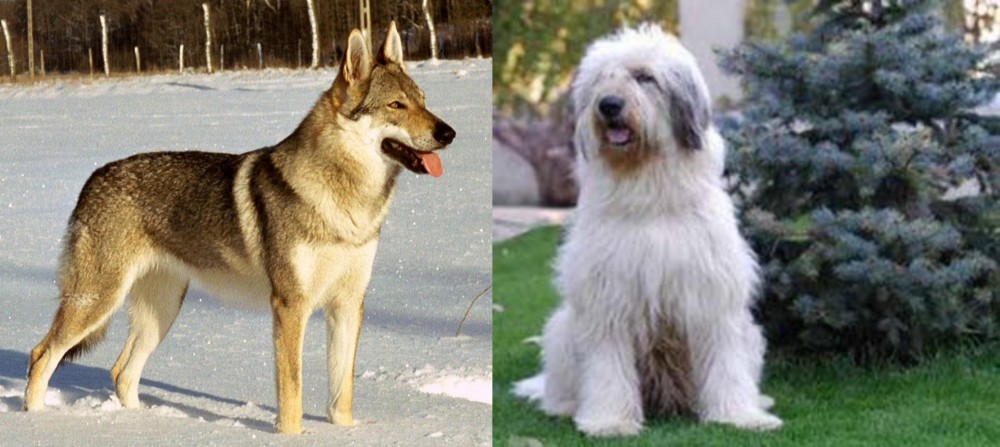 Czechoslovakian Wolfdog is originated from Czech Republic but Mioritic Sheepdog is originated from Romania. Czechoslovakian Wolfdog may grow 10 cm / 3 inches shorter than Mioritic Sheepdog. Czechoslovakian Wolfdog may weigh 34 kg / 74 pounds lesser than Mioritic Sheepdog. Both Czechoslovakian Wolfdog and Mioritic Sheepdog has almost same life span. Both Czechoslovakian Wolfdog and Mioritic Sheepdog has almost same litter size. Both Czechoslovakian Wolfdog and Mioritic Sheepdog requires Moderate Maintenance.
Czechoslovakian Wolfdog is originated from Czech Republic but Mioritic Sheepdog is originated from Romania. Czechoslovakian Wolfdog may grow 10 cm / 3 inches shorter than Mioritic Sheepdog. Czechoslovakian Wolfdog may weigh 34 kg / 74 pounds lesser than Mioritic Sheepdog. Both Czechoslovakian Wolfdog and Mioritic Sheepdog has almost same life span. Both Czechoslovakian Wolfdog and Mioritic Sheepdog has almost same litter size. Both Czechoslovakian Wolfdog and Mioritic Sheepdog requires Moderate Maintenance.
 The Czechoslovakian Wolfdog is a mix between a German Shepherd and a Carpathian wolf. In fact the Czechoslovakian Vlcak is another name for the Czechoslovakian Wolfdog and Vlcak is the Czech name for a German Shepard dog.
The Czechoslovakian Wolfdog is a mix between a German Shepherd and a Carpathian wolf. In fact the Czechoslovakian Vlcak is another name for the Czechoslovakian Wolfdog and Vlcak is the Czech name for a German Shepard dog.
When you translate the name, it means Czechoslovakian German Shepherd. There was a biological experiment that began in 1955 and these experimental breedings went on for a decade, so that in 1965 a plan was created for the breeding of this new breed.
It was in 1982 that the Czechoslovakian Vlcak was recognized as a national breed in the former Czechoslovakian Republic and recognized by the United Kennel Club in 2006.
This attractive, intelligent looking dog won the title of ‘World Champion’ at the World Dog Show in 1990 and in 1999, the breed met all criteria of the World Canine Organization, earning full recognition of the Czechoslovakian Wolfdog breed.
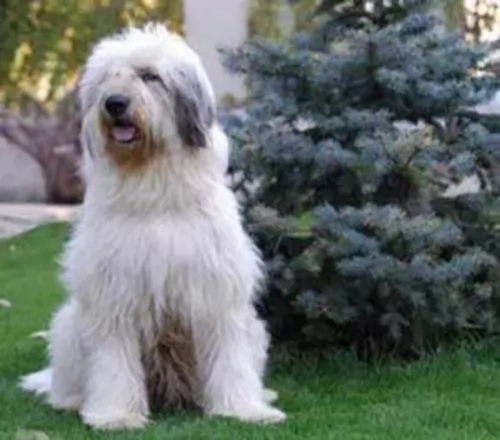 This is a large dog coming from the Carpathian mountain area of Romania.
This is a large dog coming from the Carpathian mountain area of Romania.
He has always been an excellent working dog, guarding and protecting sheep. Farmers always kept these dogs as working dogs, with no written records being kept about the development of the breed.
The breed is ancient, possibly dating back to ancient Roman times. It was in the 20th century that interest in the breed was ignited, and in 1981 the first official breed standard was recorded. The breed was also registered with the Federation Cynologique Internationale in 2005.
 The Czechoslovakian Wolfdog looks like a true German Shepherd/Wolf mix with his erect ears, bushy tail and straight, muscular legs.
The Czechoslovakian Wolfdog looks like a true German Shepherd/Wolf mix with his erect ears, bushy tail and straight, muscular legs.
The eyes of the dog are slanted and brown. He stands at about 65cm in height and weighs up to 26kg. The thick coat of the dog is greyish in color but other colors come in as well such as white, cream, black, silver and yellow - all wolf colors. In fact the density of the coat as well as the color changes according to the seasons.
The coat is particularly thick in the Winter, thinning out in the Summer. The coat color may be yellow-gray or silver-gray.
Having a pet which has some wild animal mix can be risky and dangerous. Adding wild animal DNA means that you can get some of the behavior of the wild animal added in and this can be asking for trouble.
When the Czechoslovakian Wolfdog turns on a person, he will be blamed and put down, whereas it is the stupidity of the human to breed such dogs and bring them into their homes in the first place. You need to be careful with children in the home, especially if they don’t know how to treat a dog with respect.
Nonetheless the Czechoslovakian Wolfdog is able to develop a deep relationship with his owner. He is a dog who, when training and socialized, can gets on well with his human family as well as with other pets in the family.
He has got other excellent characteristics such as being fearless and courageous. He is intelligent and learns easily.
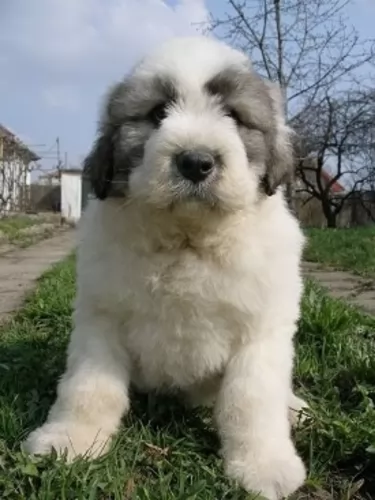 The Mioritic Sheepdog looks very much like the Old English Sheepdog with his huge body covered with long hair.
The Mioritic Sheepdog looks very much like the Old English Sheepdog with his huge body covered with long hair.
His head is also large with a black nose and smallish to medium length floppy ears. The color of the double coat is usually white, cream or pale gray, and sometimes you will find patches of these colors.
The tail has always been traditionally docked, otherwise the tail is left long with a slight curl at the end. The height of the dog is 65 to 75cm and he weighs roughly 50–60kg. Below the thick coat is a muscular dog with strong, straight legs which can help him become quite agile and speedy when needed. Allowed to breed, they can produce anything from 3 to 9 of the most adorable looking puppies.
The Mioritic Sheepdog is a balanced dog, loving to be with his owners but being wary of strangers. He is a brave dog, willing to guard his human family with his life.
He is also a strong-willed and dominant so it will be to his benefit to be trained and socialized so that he becomes obedient and easy to have around.Training won’t be difficult as he is an intelligent breed and already naturally obedient.
He is an energetic dog too so he will need to have regular exercise and games. He therefore gets on well with children in the home, loving to join in with all their games. He will need to be supervised around small children just because of his cumbersome, large size.
 The beautiful Czechoslavakian Wolfdog resembles a wolf and in many of these dogs, their characteristics are wolf-like too. The dog is confident and independent, but it also able to form good relationships with his human family.
The beautiful Czechoslavakian Wolfdog resembles a wolf and in many of these dogs, their characteristics are wolf-like too. The dog is confident and independent, but it also able to form good relationships with his human family.
Many people thrill at the idea of having a pet which has a wild side to him, but there is a price to pay for having such a pet in your home. Their wild side can suddenly come to the fore, with dangerous consequences.
There are so many dog breeds to choose from that surely it isn’t necessary to start tampering with animals from the wild?
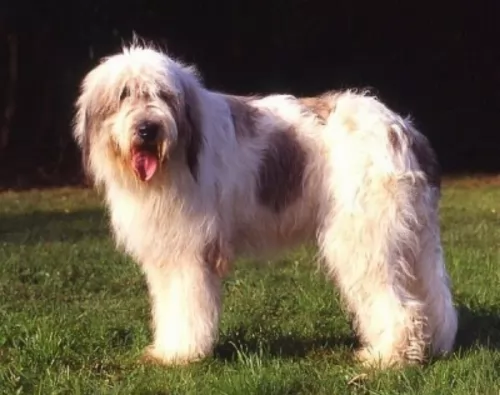 The Mioritic Shepherd has always been used to guard and protect livestock, but even though he has always taken this role seriously, he is calm and loving around his human family, making a splendid family pet.
The Mioritic Shepherd has always been used to guard and protect livestock, but even though he has always taken this role seriously, he is calm and loving around his human family, making a splendid family pet.
He also plays the role of guardian and protector of his human family seriously. He is a big strong dog and training and socialization will become necessary as he can become aggressive with certain people who he doesn’t trust.
Inviting one of these dogs into your home will ensure having a constant and loving companion at your side.
 Your Czechoslovakian Wolfdog is a healthy dog who with good health care, can reach the age of 12 to 15 years. However, it is good to be forewarned about some dog sicknesses that your dog might get and which could be detrimental to your dog’s quality of life.
Your Czechoslovakian Wolfdog is a healthy dog who with good health care, can reach the age of 12 to 15 years. However, it is good to be forewarned about some dog sicknesses that your dog might get and which could be detrimental to your dog’s quality of life.
This disease comes about when the ball and socket joint at the hip doesn’t form properly. The bones rub and chafe when the dog moves and the condition just gets worse as time goes on. Your dog can actually end up with arthritis, and worse, become lame.
This is a progressive deterioration of the spinal cord which causes lameness in your pet’s hind legs. It is incurable and can be the end of your pet. The exact cause of this tragic illness is unknown.
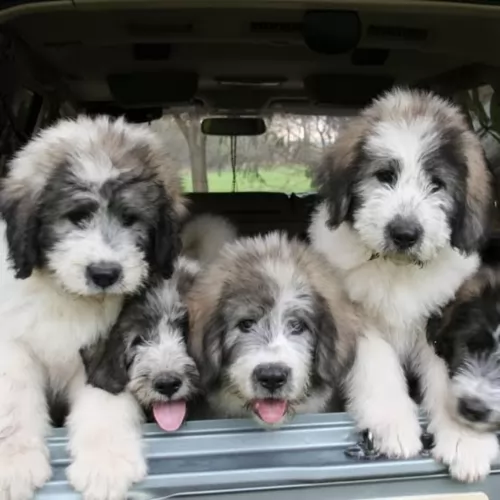 The Romanian Mioritic Shepherd Dog is a truly hardy dog breed and with good care such as good food and exercise can reach 14 years of age.
The Romanian Mioritic Shepherd Dog is a truly hardy dog breed and with good care such as good food and exercise can reach 14 years of age.
There are always some common dog illnesses to look out for and because he is a large dog, hip dysplasia can be a problem.
This is a disease where there is abnormal growth of the hip joints. Smooth movement of the joint is hindered and this leads to inflammation and pain.
At first you may find your dog limping and then you may find that after lying down, he battles to get up again. The joint becomes thickened with less mobility and the dog is reluctant to play like he used to. He will certainly need to get to the vet for treatments to make him more comfortable.
 Vlcaks have been specifically bred for stamina and if you neglect to exercise him, he’ll become bored and frustrated and possibly destructive and aggressive. He must be trained and he must be constantly provided with lots of exercise and activities.
Vlcaks have been specifically bred for stamina and if you neglect to exercise him, he’ll become bored and frustrated and possibly destructive and aggressive. He must be trained and he must be constantly provided with lots of exercise and activities.
Because of the wolf side of this dog, Czechoslovakian Wolfdogs have a high prey drive, so he will need to be trained and socialized if you want him to get along with your other pets in the home.
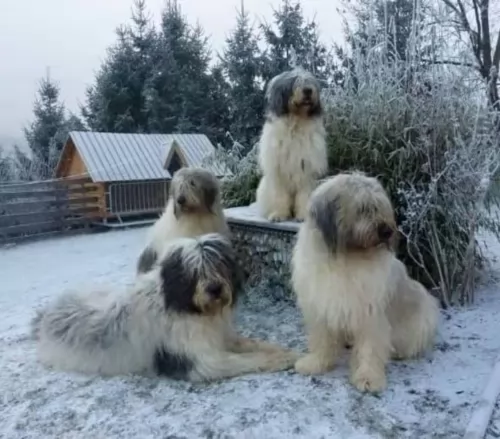 The Mioritic Sheepdog’s long hair is coarse and will need to be regularly brushed to keep it free of tangles. It will certainly need to be brushed 2 or 3 times a week, while some owners of this dog will prefer to have the coat professionally clipped. Because of the long hair, while brushing him it is an excellent time to check for ticks and fleas.
The Mioritic Sheepdog’s long hair is coarse and will need to be regularly brushed to keep it free of tangles. It will certainly need to be brushed 2 or 3 times a week, while some owners of this dog will prefer to have the coat professionally clipped. Because of the long hair, while brushing him it is an excellent time to check for ticks and fleas.
The food you give your pet plays such a critical role in his health and longevity. Always make sure that you’re giving your pet an uncomplicated diet to avoid stomach upsets.
Give him the best commercially manufactured kibble. To provide him with some variety, add in some boiled chicken, cooked vegetables such as potato, carrots and spinach to his kibble from time to time. He will also benefit greatly from having some raw meat added into the kibble occasionally.
Learn to know which human foods are totally toxic to him and avoid these. Make sure he is never without cool, fresh water.